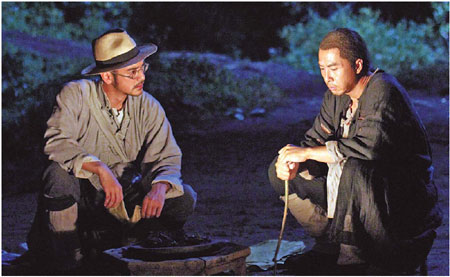 |
| Wu Xia, starring Takeshi Kaneshiro (left) and Donnie Yen, will be released on July 4, giving martial art films a new spin. Provided to China Daily |
Veteran Hong Kong director Peter Chan’s latest film aims to demystify martial arts, while also tackling moral dilemmas.
It requires courage to name a film after its genre, as audiences will expect it to be all encompassing.
But that does not seem to worry veteran Hong Kong director Peter Chan whose latest film is titled Wu Xia, or literally “martial arts chivalry”.
“Wu Xia will redefine martial arts,” he says.
Set in a small village in South China, the film has a storyline that has echoes of CSI or Discovery Channel’s Crime Scene.
A paper-maker kills two robbers and becomes the hero of his village. But a detective, a Chinese version of the fastidious doctor House of the eponymous TV medical drama, discovers from the bodies that only a kungfu master could have rendered the killing blows.
As his investigation unfolds, the paper-maker’s real identity is revealed and poses a catastrophe for the village.
The film is 49-year-old Chan’s first martial art film, although like other Chinese of his generation, he grew up on a steady diet of such films.
His first exposure to, and favorite of, this genre are the films of Jimmy Wang in the 1960s and 70s, known for his robust masculinity. However, as the genre evolved into gravity-defying fantasy after the mid-1990s, he felt estranged from it.
“I find many martial art films too illusory,” he says. “The only one that has thrilled me recently is Crouching Tiger, Hidden Dragon. Ang Lee achieves a breakthrough by making characters fly for a reason.”
He, too, wanted to give the old genre a new spin, but could not figure out how until 2009 when he saw a television program, which depicted in detail how a bullet penetrates a person’s skin, flesh, veins and heart.
“I had my concept – to explain Chinese martial arts through physiology and medicine. I then made a story to fit it.”
Thus, he sets the film in 1917, a time when Western science had a growing influence on the Chinese.
Like in House or CSI, the detective played by Takeshi Kaneshiro analyses the impact of kungfu attacks on one’s body.
While martial art films may show a master killing his enemy with what appears to be a light finger tap, Chan makes the detective tell the audience it is because the tap hits an important acupuncture point and causes a clot to form in a blood vessel. Frequent close-ups of organs and nerves enhance his explanation and create the film’s unique visual style.
“I consulted with acupuncture specialists, cardiologists and brain surgeons,” Chan says. “To shoot a film about swordsmen flying is a safe choice, but I don’t see a reason for me to do it. This is an established genre, which leaves little room for originality, but at the same time I see a chance to revitalize it.”
Not everything is new, though. Action remains a critical part of the film, to be released on July 4.
Chan ropes in Donnie Yen, the star of Iron Monkey and the Ip Man series, to choreograph the fight scenes and play the mysterious paper-maker. With his mastery in both Chinese kungfu and Western mixed martial arts, 48-year-old Yen has built his name as the new kungfu superstar after Jackie Chan and Jet Li.
Both Yen and Chan dislike wires, and agreed that the fighting would be dazzling but more grounded.
Characters do not suddenly fly off the ground or race on water, but there is dramatic close-contact combat on the ground and even one scene on a rooftop.
The Hollywood Reporter calls the action sequences “swift and savage”, and “arguably the best that lead actor Donnie Yen has choreographed for years”.
The film’s ending has Chan and Yen paying their homage to traditional martial art cinema and the signature figure of its golden days. The 68-year-old Jimmy Wang, China’s John Wayne and star of Chang Cheh’s One Armed Swordsman series, has a fierce fight with Yen, which ends in a dramatic twist.
Chan presents his own world of swordsmen, where the hero’s moral struggles and self-discovery are as painful as those of the common people. The detective has to decide between sticking to the law or giving the criminal a chance, while the paper-maker is haunted by his complex past.
Variety’s Justin Chang said he was reminded of David Cronenberg’s A History of Violence when watching the film in Cannes in May, noting that “this clever if over-amped thriller tackles themes of identity, honor and the latent killer instinct with a playful spirit that’s never at odds with its underlying seriousness”.
Chan describes the film as another exploration of answers to life’s problems.
“Westerners go to shrinks when they have confusions about life and themselves, but in China we don’t usually do that. We find our own ways,” he says. “For example, I make films. I spend two years shooting a film to find answers.”
In the war epic The Warlords, he questions if one should be forgiven for sacrificing brothers if that creates welfare for a larger group. In the acclaimed romantic tale Comrades, Almost a Love Story, he seeks the answer to what is true love.
“In Wu Xia, I want to know, can we really wipe out our past?”
And the answer, he says, is up to the audience.

Leave a Reply